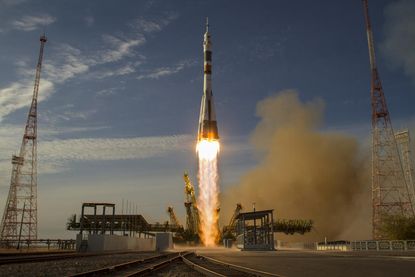Russia moves to prohibit the U.S. from using the ISS in 2020
Bill Ingalls/NASA/Getty Images

Russia's ongoing feud with the United States has hit new heights — literally. In retaliation for the sanctions the U.S. imposed on Russia during the Ukraine crisis, the country said it won't allow the U.S. use the International Space Station after 2020.
The measures, which were announced today by Russia's deputy Prime Minister Dmitry Rogozin, also prohibit the U.S. from using the ISS's rocket engines to launch new satellites. Although the space station is manned by a Russian and American crew, the only way to reach it is by using Russia's Soyuz spaceships.
The U.S. had hoped to keep the aging ISS floating until 2024. Rogozin said after 2020, Russia will likely pull its money from the space station and move it to a "project with more prospects." Rogozin also slammed NASA for drastically scaling back its space exploration projects in recent years. "The Russian segment can exist independently from the American one," he said. "The U.S. one cannot."
Subscribe to The Week
Escape your echo chamber. Get the facts behind the news, plus analysis from multiple perspectives.

Sign up for The Week's Free Newsletters
From our morning news briefing to a weekly Good News Newsletter, get the best of The Week delivered directly to your inbox.
From our morning news briefing to a weekly Good News Newsletter, get the best of The Week delivered directly to your inbox.
Create an account with the same email registered to your subscription to unlock access.
Sign up for Today's Best Articles in your inbox
A free daily email with the biggest news stories of the day – and the best features from TheWeek.com
Jordan Valinsky is the lead writer for Speed Reads. Before joining The Week, he wrote for New York Observer's tech blog, Betabeat, and tracked the intersection between popular culture and the internet for The Daily Dot. He graduated with a degree in online journalism from Ohio University.
-
 The laws of finding – and keeping – treasure in Britain
The laws of finding – and keeping – treasure in BritainIn the Spotlight Amateur archaeology is on the rise but flouting the laws can land you in prison
By Chas Newkey-Burden, The Week UK Published
-
 Properties of the week: houses with enchanting gardens
Properties of the week: houses with enchanting gardensThe Week Recommends Featuring pretty homes in Hampshire, Devon and West Sussex
By The Week UK Published
-
 Quiz of The Week: 27 April - 3 May
Quiz of The Week: 27 April - 3 MayPuzzles and Quizzes Have you been paying attention to The Week's news?
By The Week Staff Published
-
 Puffed rice and yoga: inside the collapsed tunnel where Indian workers await rescue
Puffed rice and yoga: inside the collapsed tunnel where Indian workers await rescueSpeed Read Workers trapped in collapsed tunnel are suffering from dysentery and anxiety over their rescue
By Sorcha Bradley, The Week UK Published
-
 More than 2,000 dead following massive earthquake in Morocco
More than 2,000 dead following massive earthquake in MoroccoSpeed Read
By Justin Klawans Published
-
 Mexico's next president will almost certainly be its 1st female president
Mexico's next president will almost certainly be its 1st female presidentSpeed Read
By Peter Weber Published
-
 North Korea's Kim to visit Putin in eastern Russia to discuss arms sales for Ukraine war, U.S. says
North Korea's Kim to visit Putin in eastern Russia to discuss arms sales for Ukraine war, U.S. saysSpeed Read
By Peter Weber Published
-
 Gabon's military leader sworn in following coup in latest African uprising
Gabon's military leader sworn in following coup in latest African uprisingSpeed Read
By Justin Klawans Published
-
 Nobody seems surprised Wagner's Prigozhin died under suspicious circumstances
Nobody seems surprised Wagner's Prigozhin died under suspicious circumstancesSpeed Read
By Peter Weber Published
-
 Western mountain climbers allegedly left Pakistani porter to die on K2
Western mountain climbers allegedly left Pakistani porter to die on K2Speed Read
By Justin Klawans Published
-
 'Circular saw blades' divide controversial Rio Grande buoys installed by Texas governor
'Circular saw blades' divide controversial Rio Grande buoys installed by Texas governorSpeed Read
By Peter Weber Published